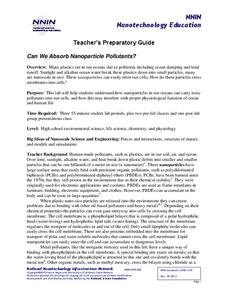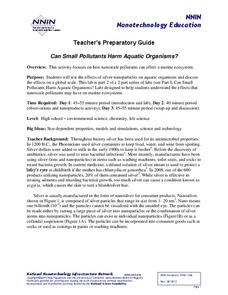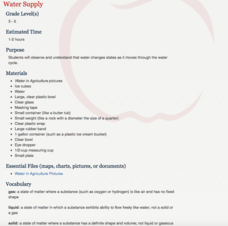Safe Drinking Water Foundation
To Filter or Not to Filter
Drinking clean water can be taken for granted. Explore the process and high cost of filtering water with a water pollution and filtration activity. Young scientist build a filtration system to filter polluted water, examine the economics...
Curated OER
The East Fork Project
Students identify possible sources of health risks, types of exposures, routes of exposure, and populations that could be affected after discussing water pollution and environmental health hazards. After discussion, students conduct a...
Curated OER
Point- vs. Non-point Pollution
Students differentiate between point and non-point pollution and determine how the different types of pollution are harmful to aquatic ecosystems. They complete a series of tests on a sample of "polluted" water and a sample of "pure" water.
Alabama Learning Exchange
WATER You Doing to Help?
Auntie Litter is here to educate young scholars about water pollution and environmental stewardship! Although the 15-minute video clip is cheesy, it's an engaging look at the water cycle and conservation. Learners start by illustrating...
University of Florida
Protecting Our Water Resources
Teach young environmentalists to protect their planet's resources with a set of interactive experiments. Kindergartners and other youngsters learn about watersheds and the water cycle, while older elementary learners focus on fertilizer...
National Nanotechnology Infrastructure Network
Can We Absorb Nanoparticle Pollutants?
Just because we can't see it doesn't mean it isn't there! A growing concern for environmental scientists is toxic nanoparticles in our air and water. Young scholars conduct an experiment to demonstrate how these particles can cross our...
National Nanotechnology Infrastructure Network
Can Small Pollutants Harm Aquatic Organisms?
Nanoparticles have toxic effects on plant and animal life—even though you can't see them. The second lesson of a two-part series has young scientists conduct an experiment that exposes plant and animals to nanoparticle pollutants. They...
NASA
The Case of the Wacky Water Cycle
Join the tree house detectives in learning about the processes of the water cycle, water conservation, water treatment, and water as a limited resource.
San Francisco Public Utilities Commission
Let's Save Water: Water Conservation
Did you know that cutting down your shower by one minute a day can save five gallons of water? Learn about water conservation with a science reading activity. After kids finish reading key terms and water-saving tips in a reading...
Curated OER
WATER HERE AND THERE
Introduce the topic of water conservation with a little drama. Dressed as snowflakes, hail stones, or rain drops class members dramatize the events in a narration of the water cycle. The series of lessons that follow focus on...
Curated OER
Must Be Something in the Water
Students research water pollution and create a class guide to raise the public's awareness about this issue. They write papers analyzing the effectiveness of the guide after it is read by members of the community.
Curated OER
Water Pollution Prevention and Conservation
Students examine how to conserve water. They also discover how to prevent water pollution. They examine the Earth's water distribution as well.
SRI International
Fine Filters
Need to know where your class' knowledge stands? Use these pre- and post-tests to determine your learners' knowledge about nano membranes and nano filters in relation to the filtering of water, specifically contaminated water.
National Institute of Food and Agriculture
Water Supply
Participate in three activities that look at the earth's limited water supply and the changes water goes through as it enters each phase of the water cycle. The resource is complete with three activities that demonstrate the changing...
Curated OER
Keeping our Water Clean
Second graders discuss how our actions impact the quality of water. In this environmental science instructional activity, 2nd graders watch a short film and discuss the problem of polluted water. Students are then divided into groups and...
Curated OER
The Hydrologic (Water) Cycle
Learners construct a model of the hydrologic cycle, and observe that water is an element of a cycle in the natural environment. They explain how the hydrologic cycle works and why it is important, and compare the hydrologic cycle to...
Baylor College
What Is a One Part Per Million Solution?
Water may appear to be crystal clear, but there could be dissolved substances present. Lab groups make a one-part-per-million of a food coloring solution to demonstrate this concept. As part of an outstanding unit about water, this...
Curated OER
Selecting the Tap: Water Safety
Examine water as a scarce natural resource instead of taking it for granted. Middle schoolers identify the traits of potable water, and research local water sources to determine if they are impaired or not.
SRI International
The Water Crisis
Water, water, everywhere, right? Wrong. Learners assess their own knowledge of water availability on Earth. Then, through a reading, a teacher-led presentation, and an activity, pupils learn about the importance of available clean...
Curated OER
Pollution Solutions: Earth Day
Eighth graders explore water pollution. In this stewardship instructional activity, 8th graders draw comparisons between potable and impaired waters. Students use the Learning Link website to examine ways people are fighting pollution...
Curated OER
Water Pollution - Group Presentation
Pupils investigate water pollution at a web site and apply it toward a group presentation.
Curated OER
Watershed Works: Unit 3
Geology whizzes observe the effects of change within a model of a watershed. They place replica waste dumps within the models and note the path that the waste takes as water passes through. This detailed lesson plan provides teacher...
Curated OER
The Impact of Water Pollution on Global Peace
Tenth graders participate in hands-on activities that require them to consider the implications of water pollution. In this environmental stewardship lesson, 10th graders conduct 6 experiments pertaining to water pollution and discuss...
Earth Day Network
Filtering Water
See the water filtration system up close with a fun science experiment. Young scientists work for several class periods to design a water filter using household objects, and then decide which filter material would be most effective in...

























